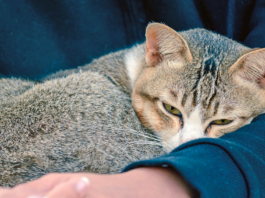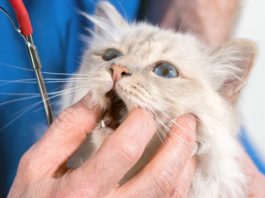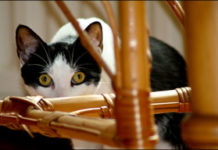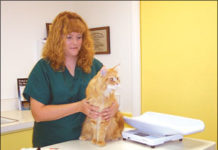Taking Your Cat For a (Car) Ride
Do you simply dread the thought of taking a car trip with your cat? First, you must be clever enough to catch the wily feline. Then — after she is safely in her carrier — you must brace yourself for the wailing and thrashing that will begin either from the moment of capture or, at the very latest, once the car begins to roll. And where are you heading? To the veterinary hospital, probably. Afterwards, you breathe a sigh of relief — knowing that you likely won’t have to go through this again until the next visit. So why do our cats behave this way? Well, imagine if you were a child and were rather intimidated by your aunt Jean. Though you rarely traveled by bus, once each year, you and your family boarded a bus to aunt Jean’s. Maybe you too kicked and screamed, struggling to avoid getting onto the bus. You more than likely cried or complained during the journey as well. As for bus trips? The mere suggestion might send you running.
Less Stressful Vet Visits
The American Association of Feline Practitioners (AAFP) and the International Society of Feline Medicine (ISFM) have released the Feline Friendly Handling Guidelines. These guidelines were developed by a panel of experts to create a less stressful experience for cat patients while meeting their medical needs. The Feline Friendly Handling Guidelines - endorsed by American Animal Hospital Association (AAHA) - were developed to provide the best care for cats and to increase vet visits.
Research Says: Stress Can Make Our Cats Sick
According to a recent Ohio State University, our pets can get sick from stress - just like us. The study found that otherwise healthy cats show signs of illness when stressed. And cats diagnosed with feline interstitial cystitis (FIC) became healthier when stress levels were reduced, the study showed. Twelve of the 32 cats in the three-year study were healthy, while 20 had FIC, a chronic pain syndrome that affects the cats bladder. According to researchers, lower urinary tract diseases occur in about 1.5 percent of house cats, and many pet owners cant tolerate the mess that accompanies it. As a result, millions of sick cats are put down or relinquished to shelters every year.
When Your Cat Dislikes Company
When Safflower, a 12-week-old female kitten, earnestly beckoned from her cage in a Manhattan animal shelter, Deirdre knew she was the one for her. The kitten settled in quickly with Deirdre and her two roommates in a small apartment. Safflower loved everyone; Deirdre was even jealous when Safflower would occasionally sleep on her roommates beds instead of her own. The growing kitten played and romped with visitors, and even greeted people at the door.
How to Soothe Your Scaredy Cat
Whenever cat owner Susan Lomond turns on her printer, her cat Sylvester dashes over to sit on it, lie on it and watch in fascination as the paper comes out. But when Susans friend Diana turns on her printer, her cat, Petra, flees in terror. Cats respond differently to noise depending on their personalities and experiences - and even their genetics. When cats get scared of noise, we often feel the need to protect them. Heres what you can do to help your cat cope with noise. Scary Sounds. Cats differ from dogs when it comes to being frightened by noise. Dogs are notoriously afraid of thunder and fireworks, and will often try to escape from the house in a panic.
How to Ease Cat Carrier Stress
You need to take your cat to the veterinarian for a checkup. When you retrieve the cat carrier from the closet, your cat disappears. The ensuing chase tires you out and stresses your cat, making his heart beat faster and possibly elevating his temperature. Sound familiar? For many cat owners, getting their cats into a carrier is a battle of wits and wills - but its necessary preparation for veterinary visits, emergency evacuations or moving to a new location. "You may even want to put your cat in a carrier to keep her from escaping when painters or housekeepers come," says Ellen Lindell, VMD, a board-certified member of the American College of Veterinary Behaviorists. So why wait until an emergency arises? Getting your cat accustomed to the carrier simply takes foresight and training.
Does Your Cat Need Help?
Inappropriate urination or defecation. Aggression. Inappropriate scratching or destructive behavior. Eating or chewing non-food materials. Cat carrier avoidance. Separation anxiety. Other fears and phobias. When your cat develops a behavior problem, you may need professional advice. But whom should you call? Your veterinarian should be first on the list. But for particularly difficult problems, he or she may enlist the help of a certified applied animal behaviorist or a board-certified veterinary behaviorist. While either one can help you solve your cats adjustment difficulty, there are some differences in the services each provides.
Stressful Times Impact Our Pets, Too
To you ever wonder if any of the anxiety and tension you sometimes bring home can also affect your pets? These challenging economic times can indirectly be hard on our cats, too. Experts feel that cats will indeed react to changes in the emotional behavior of their owners. So, if we believe that cats can sense our stress - and we certainly are living in an era of increased worry and anxiety - it stands to reason that our cats are experiencing higher levels of stress, as well. At what point are our feline friends exposed to more stress then they can handle?
Cats and Extreme Stress
Two years ago, Alex McCarthy adopted a lively, affectionate kitten from a shelter in New York City. Alex, her cat Kit and two roommates lived harmoniously in a tiny New York apartment. Then Alex decided to move with Kit to an apartment of her own. "The day the movers came, Kit was terrified," says Alex. Once they were settled in the new apartment, Kit was never the same. She would only allow Alex to go near or touch her. When visitors came, she would run up and sniff them, then hiss. If they attempted to pet her, she would lash out at them with her paws. Sometimes, she even scratched them. Now its people who are terrified of Kit. What happened to the sweet kitten? She may be suffering from post traumatic stress disorder (PTSD), which can occur after a very stressful or frightening event - just as it can with humans.
Neurological Disorders
Although its only the size of a golf ball, your cats brain is just about as complex and, when it comes to matters of vital concern, just about as capable as your brain. Of course, a cat uses its brain and the other components of its neurologic system to address needs and desires that are often different from yours. After all, you like to read books and watch movies; your cat likes to torment mice and play with balls of yarn. Sad to say, a cats neurologic system also resembles yours in the wide variety of serious disorders with which it can be afflicted, sometimes with fatal consequences. According to Curtis Dewey, DVM, an associate professor of neurology and neurosurgery at the Cornell University College of Veterinary Medicine, he and his colleagues typically treat four or five neurologically compromised cats each week at the universitys animal hospital.
Help Calm Anxiety at the Vet’s Office
Isnt it remarkable that most cats are well-behaved when they visit their veterinarians? First, they are captured and put into an automobile. They remain in their containers, sheltered but helpless, in a room filled with the scent of unfamiliar cats, humans and even dogs. Finally, every bit of security is lost when the cat is removed from its newfound shelter and the veterinary team places the cat on the examination table. Why do cats behave so nicely? Fear can sometimes render a cat motionless and therefore cooperative. Fearful cats - whether immobile or aggressive - can benefit from a behavior modification specifically designed to address high arousal. But what about the average cat, dare I say the "normal" cat? There may be no indication for intensive therapy or anxiety-reducing medication. But clearly, the veterinary experience is not entirely stress-free. Rather than take a cats good behavior for granted, why not reduce some of the stressors that can occur during a visit to the veterinary hospital? Lets examine some components of the visit that could trigger anxiety.
Labeling a Cat As “Bad”
Everyone wants to feel good about his cat, right? Yet all too often, a client will enter the consultation room, greet me and quickly announce that his cat is "bad." As a stranger to both the cat and his person, I must take a deep breath prior to asking, delicately, just what this cat has done to earn such a label. Oddly enough, the crime is nearly always the same - the cat eliminates outside his litter box. Why the label? Unsympathetic ears abound. Friends and relatives may claim that they have never lived with a cat that voided outside a litter box. They may state that this type of behavior should not be tolerated and that no "good" cat would do such a thing
















